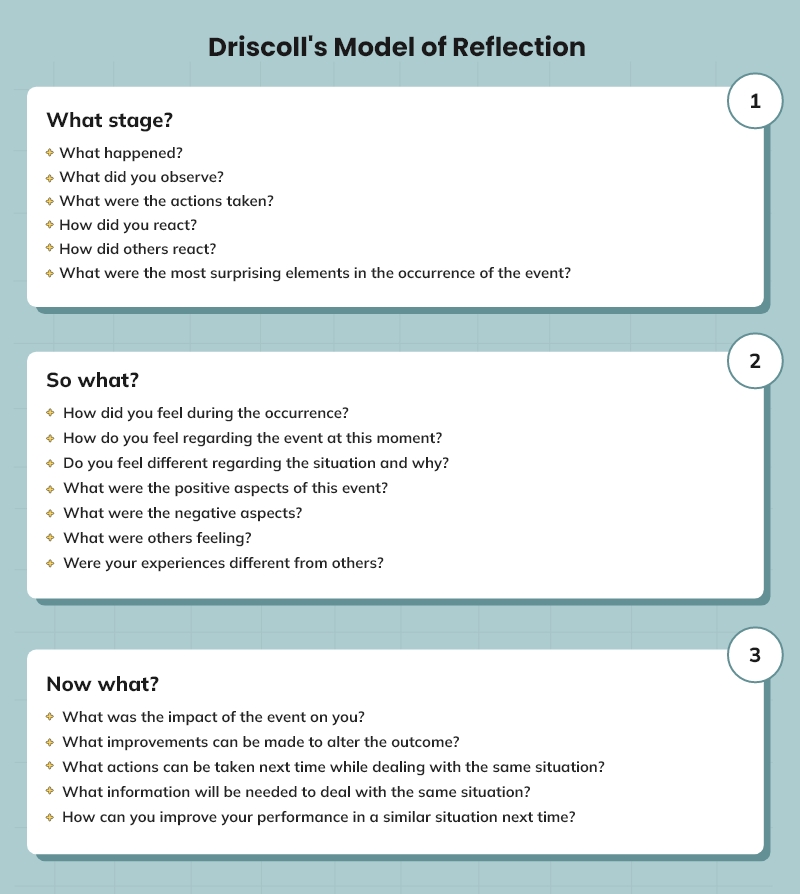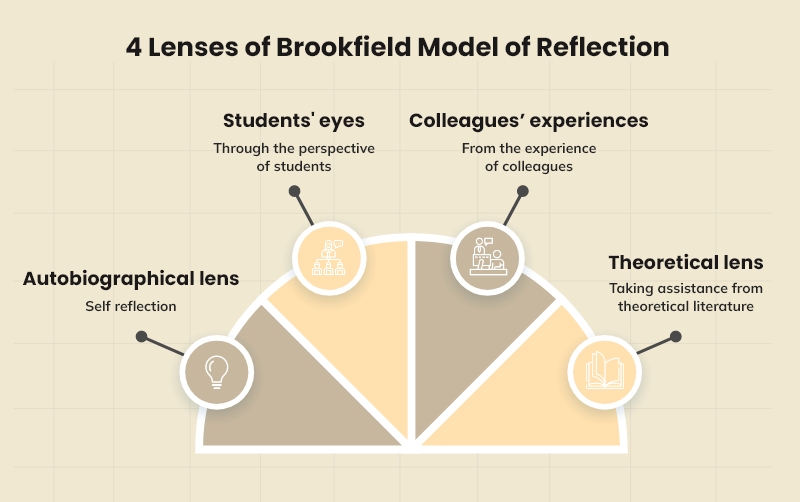My Reflection:
- I chose the Driscoll’s model to discuss my science demonstration in EDCI 403 because I found it was really beneficial how each section had specific guiding questions. I felt it really aligned with how my brain likes to process things; therefore, I decided it would be the best model for me personally.
Driscoll’s Model:

Science Demonstration Reflection:
1. What stage?
What happened?
In our science class Andrea and I completed a science demonstration for grade 3 on the topic of heat conduction. We started by showing the class the difference between the different spoons (metal, plastic and wood) and we let them each touch the spoons so they could conduct an hypothesis as to which one they thought would melt the butter the fastest.
What did you observe?
The class was engaged and curious about what we were about to show them. They participated in the questions we asked them and they began working on the worksheet questions that we gave them and guided them to answer prior to the demonstration portion.
What were the actions taken?
When we began the experiment, we put all 3 types of spoons in one beaker that was filled with hot water. Each spoon has a bit of butter on the concave part, while the handle of the spoons sat in the hot water. We waited for the hot water to warm up the spoons and observed any changes or movement.
How did you react?
We watched the hot water warm up the spoons and we were surprised to see that the wooden and plastic spoon actually started the melt the butter faster than the metal spoon due to the height difference. Since the plastic and wooden spoons were sitting closer to the hot water than the metal spoon was, they both started melting the butter quicker since the heat from the water level was warming up the butter. We were both quite shocked because we did not expect this difference. We both brought in the supplies and because we did not compare our spoons before hand, we had a variable that we did not account for.
How did the others react?
The “students” were also shocked that this happened but they were all really supportive despite our demonstration going array and us slightly freaking out that it did not go according to the plan.
What were the most surprising elements?
We were very surprised when our demonstration did not go according to plan. When the wrong spoon started melting faster we were both very surprised that this was the outcome. Despite us knowing WHY the other 2 spoons melted faster, we were still surprised that we did not think of this going into the demo, and that the metal spoon still did not melt the butter really at all.
2. So What?
How did you feel during the occurrence?
I felt disappointed that I did not think to measure the spoon handles and I felt regretful that we did not spend time practicing the demo more before hand.
How do you feel regarding the event at this moment?
I have moved past the disappointment and now I can confidently look back and say I have learned a big lesson from it. Things do not always go as planned, I feel that Andrea and I pivoted well despite the unexpected results, but that is a small reminder just how teaching can really be. You need to be prepared for anything and being adaptable and flexible is also important. Another thing I learned is to practice before you show a class!!!
Do you feel different regarding the situation and why?
I have learned to accept that mistakes happen and that all you can do is try to be as prepared as possible and if things go sideways, it’s okay! Pivot and move on!
What were the positive aspects of this event?
The lesson that came from it! I thought it was a great simulation of what can happen in front of a class as a teacher and I felt like I did my best in the moment and now I can move forward with this experience and the lessons I gained from working through it.
What were the negative aspects?
That I felt we could have gotten a better grade on this assignment if we had put a little more effort into testing before hand:(
Were your experiences different from others?
Since I felt like I was more in the hot seat and the one conducting the experiment, I would say I definitely had a different experience than the people who were watching the demonstration. They would not have had as much pressure on them as Andrea and I did.
3. Now What?
What was the impact of the event on you?
It mainly had an impact on me in regards to my perspective on teaching and how I need to be prepared, but even if I am 100% prepared, sometimes things do not go as planned and that is not the end of the world. It definitely motivated me to develop more of a growth mindset as my initial reaction was to be mad it did not go as I planned.
What improvements can be made to alter the outcome?
Prepare prepare prepare!! Spend those extra few minutes before hand ensuring that everything seems to work before hand. Being as prepared as I possibly could have been be would have helped for the physical experiment, although I still need to remember not everything goes as planned. For the physical demonstration, next time I would make sure all spoons are the same height, as well as, putting each spoon in a different beaker so it was easier to see the outcome.
What actions can be taken next time while dealing with the same situation?
Spend time before the demonstration ensuring that there are no unexpected variables and that all our materials are as they should be.
What information will be needed to deal with the same situation? and How can you improve your performance in a similar situation next time?
Practicing a growth mindset would be beneficial for all future situations! For the demonstration specifically I would have needed more information regarding the materials we brought and making sure we measured and tested it before demonstrating in front of an audience. That was our only hitch in the experiment was the size difference in spoons so I feel it would have gone a lot differently if we communicated better about our materials!
UVIC Teacher Competencies:
This model of reflection connects to UVIC Teacher Competencies… :
- 2) Develop a growth mindset demonstrated in collaboration with others
- 4) Demonstrate an understanding of the complexity of teaching and learning
I feel this competency connects to my experience because it demonstrated the complexity of teaching and learning by highlighting that things are not always perfect and can be unexpected and you need to be able to adjust and except that it cannot always be perfect! Teaching and learning are NOT perfect!! This concept then links to comp #2 because it talks about growth mindset which I believe connects to all of this pertaining the mindset of being flexible and adapting to mistakes rather than getting upset about it. Just because it does not work the first time does not mean you should give up.
“I derive just as much happiness from the process as from the results.” ― Carol S. Dweck, Mindset: How You Can Fulfil Your Potential
Bonus notes on the Brookfield Reflective Model:
Brookfield Reflective Model:

Four Lenses:
- Autobiographical lens
- Students’ eyes
- Colleagues’ experiences
- Theoretical lens
Benefits:
- Multiple perspectives
- Self-reflection
- Considers new methods for improving teaching
- Assesses the effect of teaching on student learning
- Promotes students’ learning processes
- Opens discussion with peers
- Inclusive learning environment
Barriers:
- Complex – Difficult for people who are unfamiliar with the model
- Does not consider different cultural origins
- Can be time consuming
https://crowjack.com/blog/strategy/reflection-models/brookfield-reflective-model
One Response
judi61
Kylie,
Thank you for your post. Yes- having a growth mindset and realizing that being mindful of Science materials beforehand might have been the game changer in your experiment.
It is not often that we use the reflective models in our day to day- but knowing that they dig deep
Certainly helps you to develop that growth mindset!
Cheers,
Judi